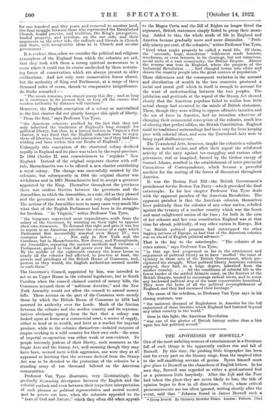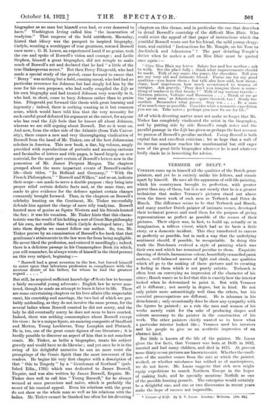THE APOTHEOSIS OF BOSWELL.*
Oux of the most unfailing sources of.entertainment in a literature full of such things is the apparently endless rise and fall of Boswell. By this time, the pushing little biographer has been cast for every part on the literary stage, from the inspired idiot to the self-skerificing servant of .genius. Byron himself must give place to Boswell as the chameleon of English letters. In his own day, Boswell was regarded as either a good-natured fool or a poisonous little busybody. After the Life and the Tour had taken the- place-they .are never likely to lose, the tide of opinion began to flow in all. directions. Scott, whose critical pronouncements are too often ignored, writing shortly after the event, said that " Johnson found in James Boswell such a • Young Boswell. By Chauncey Brewster Tinker. London : Putnam. Elbs.l
biographer as no man but himself ever had, or ever deserved to have." Washington Irving called him " the incarnation of toadyism." That emperor of the bold antithesis, Macaulay, hinted that idiocy was the passport to inspired biography.
Carlyle, scenting a worshipper of true greatness, rescued Boswell once more ; G. H. Lewes, an experienced hand if no genius, took the cue and spoke of Boswell's vision and courage ; and Leslie Stephen, himself a great biographer, did not scruple to make much of Boswell's art and declared that he had " a little of the true Shakesperean secret." But then Percy Fitzgerald, who had made a special study of the period, came forward to swear that " Bozzy " was nothing but a bold, cunning rascal, who had had no particular reverence for Johnson but had simply led him by the
nose for his own purposes, who had really compiled the Life as
his own biography and had treated Johnson very scurvily in it, who had, in short, come to bury Johnson rather than to praise him. Fitzgerald put forward this thesis-with great learning and ingenuity ; indeed, there is nothing wanting in it but common sense, which would have told him that the very necessity for such careful proof defeated his argument at the outset, for anyone
who has read the Life feels that he knows all about Johnson, whereas we are still arguing about Boswell. But so it went on.
And now, from the other side of the Atlantic (from Yale Univer- sity), there comes a new and very thoroughgoing vindication of Boswell from the hand of Mr. Tinker, one of the best Johnsonian scholars in America. This new book, a fine, big volume, amply provided with reproductions of portraits and amusing cartoons and facsimiles of letters and title-pages, is based largely on new material, for the most part certain of Boswell's letters now in the possession of Mr. James Pierpont Morgan. The chapters grouped about the more important events of Boswell's earlier life—their titles, " In Holland and Germany," " With the French Philosophers," " Boswell and Wilkes," and so on, indicate their scope—are made to serve a double purpose : they bring into proper relief certain definite facts and, at the same time, are made to give evidence for the defence against certain charges commonly brought forward. Thus, in the chapters on Boswell's celebrity hunting on the Continent, Mr. Tinker successfully defends him against the charge of mere silly toadyism. Boswell hunted men of genius as Squire Western and his friends hunted the fox : it was his vocation. Mr. Tinker hints that this charac- teristic was the result of his holding a sort of Great Man philosophy of his own, not unlike that which Carlyle developed later ; but into these depths we cannot follow our author. So, too, Mr.
Tinker proves by an examination of Boswell's fee-book that that gentleman's attainments in the law were far from being negligible. He never liked the profession, and entered it unwillingly; indeed, there is a delicious passage in his Commonplace Book (in which, you will remember, he always wrote of himself in the third person) on this very subject, beginning :—
" Boswell had a great aversion to the law, but forced himself to enter upon that laborious profession in compliance with the anxious desire of his father, for whom he had the greatest regard . . . . "
But still, ho acquired sufficient knowledge of Scots law to become a fairly successful young advocate : English law he never mas- tered, though he made an attempt to learn it later in life. There are some entertaining chapters on his love affairs (the respectable ones), his courtship and marriage, the two last of which are pro- bably misleading, as they do not involve the same person, for the several ladies whom Boswell courted he did not many, and the lady he did eventually marry he does not seem to have courted.
Indeed, there was nothing commonplace about Boswell except his vices : he is a unique figure, an amazing composite of Sandford and Merton, Young Lochinvar, Tony Lumpkin and Plutarch.
He is, too, one of the great comic figures of our literature ; it is hardly possible to discover an aspect of him that is not somehow comic. Mr. Tinker, as befits a biographer, treats his subject gravely and would have us do likewise ; and yet once he is in the swing of his delightful narrative he can no more resist the promptings of the Comic Spirit than the most irreverent of his readers. He begins his very first chapter with a description of that " Ode to Tragedy " by a " Gentleman of Scotland " (pub- lished Edin., 1761) which was dedicated to James Boswell, Esquire, and was also written by James Boswell, Esquire. Mr. Tinker does well to call him " Young Boswell," for he always seemed at once precocious and naive, which is probably the secret of his comical appeal. Even his relations with the great do not show us the whole man so well as his relations with the ladies. Mr. Tinker cannot be thanked too often for his diverting
chapters on this theme, and in particular the one that describes in detail Boswell's courtship of the difficult Miss Blair. Who could resist the appeal of that paper of instructions which the youthful Boswell wrote out for his friend, the mild young clergy- man, and entitled " Instructions for Mr. Temple, on his Tour to
Auchinleck and Adamtown " ? The part detailing Temple's duties when he makes a call on Miss Blair must bo quoted once again :-
"Give Miss Blair my letter. Salute her and her mother ; ask to walk. See the place fully ; think what improvements should be made. Talk of my mare, the purse, the chocolate. Tell you are my very old and intimate friend. Praise me for my good' qualities—you know them ; but talk also how odd, how incon- stant, how impetuous, how much accustomed to women of intrigue. Ask gravely, ' Pray don't you imagine there is some• thing of madness in that family ? ' Talk of my various travels— German princes, Voltaire and Rousseau . . . . Think of me as the ' great man' at Adamtown—quite classical, too ! Study the mother. Remember what passes. Stay tea . . . . Bo a man of as much ease as possible. Consider what a romantic expedition you are on. Take notes ; perhaps you now fix me for life."
All of which diverting matter must not make us forget that Mr. Tinker has completely vindicated the artist in the biographer, and by putting side by side Boswell's rough notes and the
parallel passage in the Life has given us perhaps the best account we possess of Boswell's peculiar method. Young Boswell is both capital fun and excellent criticism : let us hope that a waft of
its incense somehow reaches the unsubstantial but still eager nose of the great little biographer wherever he is and whatever lordly shade he is beseeching for advice.



































 Previous page
Previous page